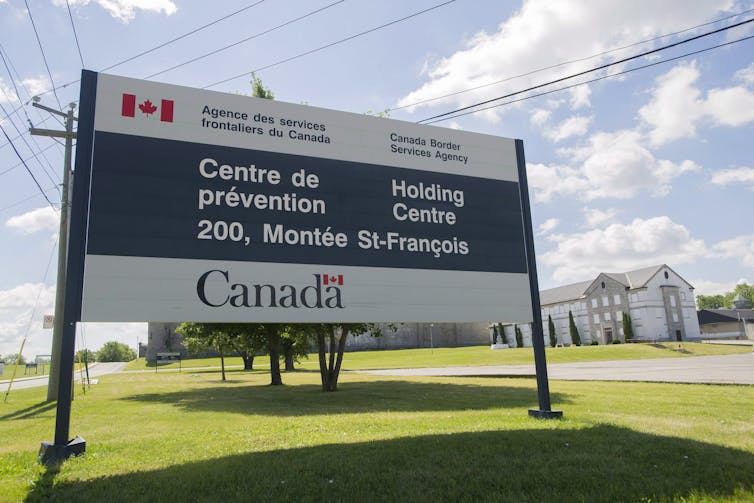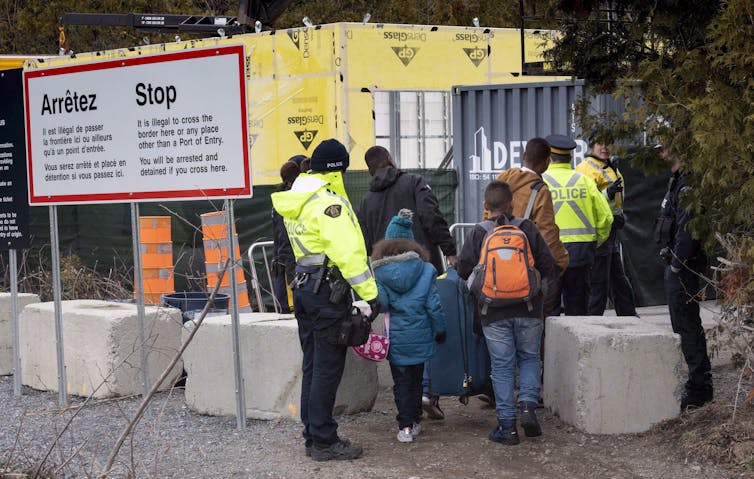
Emma Stirling-Cameron, University of British Columbia and Shira Goldenberg, San Diego State University
This month, human rights organizations launched 12 Days of Action calling on the federal government to stop the incarceration of immigration detainees in provincial jails. The effort is part of the broader #WelcomeToCanada campaign.
As scholars who study migration, we have joined this effort, alongside experts and organizations across the country serving and protecting the rights of migrants and refugees.
Four provinces — B.C., Nova Scotia, Alberta, and Manitoba — have already decided to stop the practice by cancelling their respective immigration detention contracts with the Canada Border Services Agency (CBSA). It’s time for the federal government to terminate the remaining contracts and abolish immigration detention in Canada.
Canada’s dangerous immigration detention system
Migrants and refugee claimants who are arrested and incarcerated in immigration detention are never held on criminal charges or convictions. Instead, the CBSA incarcerates people under the Immigration and Refugee Protection Act, most commonly because an officer believes the person in question will miss their immigration or refugee proceeding.
Every year, hundreds are held arbitrarily in provincial jails. Many people in immigration detention are survivors of armed conflict and persecution, having faced traumas and human rights abuses on their migration journeys.

Rather than providing early and evidence-based support for these critical needs, the current approach of detaining migrants results in severe and lasting negative health and social consequences. Canada’s immigration detention system is riddled with international human rights violations, and yet the number of immigration detainees continues to rise.
Canada is often perceived as a safe-haven for newcomers, but in 2020, 8,825 people were detained on immigration-related grounds, including 136 children. People in immigration detention face some of the most restrictive forms of incarceration in Canada, including in maximum-security prisons and solitary confinement, both of which result in restricted access to legal counsel and other vital support services.
Many are shackled, handcuffed, strip-searched and have their personal possessions taken away. People living with mental health conditions and Black men of African and Caribbean origin often face the harshest, most punitive conditions.
People in immigration detention are at risk of being detained indefinitely, as there is no legislative cap on the duration of detention. This has left many to languish in confinement, uncertain if or when they will be released or deported.
Such was the case for Abdurahman Hassan, who was held in a maximum-security prison for over three years before his death in 2015. Since 2016, at least 300 people have been held in immigration detention for over a year, with the longest detainment lasting 11 years.
Long-lasting health impacts
Research demonstrates that immigrant detention is linked to significant mental health concerns. Incarceration without charge, indefinite detainment, the threat of deportation and living in a carceral environment have been shown to contribute to high rates of suicidality, self-harm, depression, anxiety and psychosis.
Abdirahmaan Warssama, who was detained for over five years, described his experience as torture. The mental health consequences of detention continue long after release and affect people’s loved ones and communities.
Children can also be detained, which has severe consequences on their health and well-being. Even brief periods of incarceration cause significant psychological harm. Reports have documented developmental delay, suicidal ideation and selective mutism. In 2014, the UNHCR called for the abolition of child detention — Canada’s fulfilment of that call is long overdue.

In addition to mental health concerns, immigration detention has been linked to malnourishment, edema, hypertension, increased risk of certain infectious diseases, like COVID-19 and substantial unmet healthcare needs. Concerns are exacerbated among pregnant people, who face poor access to quality prenatal care, high rates of miscarriage, pre-eclampsia, pre-term delivery and infant mortality.
As a 2019 report on the state of Ontario’s jails summarized, “Correctional facilities are not equipped to provide consistent, equitable, or high-quality health care.”
The egregious conditions and policies of immigration detention have proven deadly. At least 17 people have died in CBSA custody since 2000. This includes the death of a migrant detained in the Laval Immigration Holding Centre on Jan. 28, 2022, who died after being found in “medical distress.”
Like others, they remain unnamed and their cause of death is unknown to the public. CBSA remains the only major law enforcement agency in Canada without independent civilian oversight.
End ‘crimmigration’
Canada’s unjust use of immigration detention stands in stark contrast with its image as welcoming and multicultural. Following the onset of the pandemic, authorities released hundreds of people from immigration detention to curb the spread of the virus. That provides ample evidence that immigration detention was not being used as a measure of last resort, and that alternatives to detention are available.
Instead of incarceration, newcomers should be welcomed into communities. There are a host of community-based organizations offering tailored and compassionate support to migrants and refugees across Canada.
Such alternatives to detention allow families to remain together, are more cost-effective and prevent the physical and mental health harms of detention. High rates of compliance have been observed where migrants and refugee claimants are afforded supports like housing and education, granted legal aid and case management support and treated with respect.
Based on the severe health and human rights implications of immigration detention, the public health evidence is clear — it is time to end immigrant detention once and for all.![]()
Emma Stirling-Cameron, Researcher in Sexual and Reproductive Health, University of British Columbia and Shira Goldenberg, Assistant Professor of Epidemiology, San Diego State University
This article is republished from The Conversation under a Creative Commons license. Read the original article.

